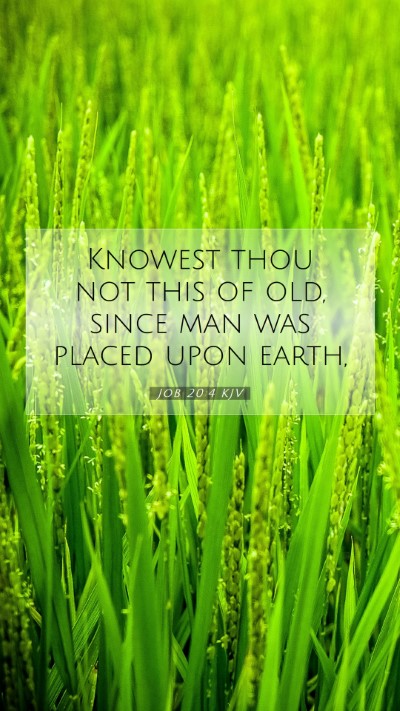Old Testament
Genesis Exodus Leviticus Numbers Deuteronomy Joshua Judges Ruth 1 Samuel 2 Samuel 1 Kings 2 Kings 1 Chronicles 2 Chronicles Ezra Nehemiah Esther Job Psalms Proverbs Ecclesiastes Song of Solomon Isaiah Jeremiah Lamentations Ezekiel Daniel Hosea Joel Amos Obadiah Jonah Micah Nahum Habakkuk Zephaniah Haggai Zechariah MalachiJob 20:4 Meaning
What is the meaning of Job 20:4?
Knowest thou not this of old, since man was placed upon earth,
Job 20:4 Bible Verse Meaning
Understanding Job 20:4 - Bible Verse Commentary
The verse in Job 20:4 states, "Knowest thou not this of old, since man was placed upon earth?" This part of Job's discourse, spoken by Zophar the Naamathite, addresses the fundamental truths regarding human existence and the justice of God. The importance of this verse lies in its reflection on the historical context of divine justice as observed in human affairs.
Bible Verse Meanings
The core message of Job 20:4 emphasizes the timeless nature of truth and wisdom regarding human life on Earth. Zophar asserts that the understanding of God’s justice is not a novel revelation but a long-standing truth known to mankind since its inception.
Bible Verse Interpretations
- Matthew Henry's Commentary: Matthew Henry explains that Zophar is drawing attention to the inherent knowledge humanity possesses about God's governance. He believes that the observation of life and its inherent challenges should lead to an understanding of divine justice and retribution.
- Albert Barnes' Notes: Barnes highlights the implication that individuals should acknowledge the moral order established by God. Zophar’s speech underscores the futility of challenging divine wisdom with human reasoning as it is universally known that God governs the world.
- Adam Clarke's Commentary: Clarke asserts that Zophar addresses Job with a tone of rebuke, reminding him that his suffering is not without reason. The verse serves as a declaration that human experiences are subject to a broader divine framework that predates and supersedes individual circumstances.
Bible Verse Understanding
Understanding this verse requires recognizing the historical and relational dynamics in the Book of Job. Job, a man of integrity, faced immense suffering, and his friends attempted to provide explanations for his plight based on their interpretations of God's justice. Zophar, in this verse, suggests that the wisdom of God’s management of the earth is well-known and that Job should not question it.
Bible Verse Explanations
The explanation of Job 20:4 reveals several layers of meaning:
- Historical Context: The verse connects Job's personal suffering to universal truths recognizable throughout human history.
- Theological Reflection: It prompts reflection on God’s sovereignty and the understanding of justice and righteousness that human beings possess.
- Moral Implications: Zophar implies that awareness of divine justice should shape human behaviors and attitudes toward suffering and prosperity.
Scripture Analysis
Analyzing Job 20:4 within the broader narrative of the Book of Job reveals the struggle of understanding suffering. It points out how friends use traditional wisdom to address Job's situation, lacking the insight into his righteousness. The verse echoes throughout the discussions on providence, suffering, and retribution — themes central to both Old and New Testament theology.
Biblical Exegesis
A detailed exegesis of this verse would involve considering the original Hebrew text and the nuances of words like "knowest" (יָדַע, yada) indicating not just factual knowledge but also experiential understanding. Zophar's rhetoric aims to compel Job to recognize his position within the framework of divine governance.
Bible Study Insights
For those engaged in bible study groups or online bible study, this verse provides a key insight: the importance of historical knowledge of God’s dealings with humanity as an anchor for faith during trials.
Cross References
- Psalms 37:2 - "For they shall soon be cut down like the grass, and wither as the green herb."
- Proverbs 3:19 - "The LORD by wisdom hath founded the earth; by understanding hath he established the heavens."
- Ecclesiastes 3:18 - "I said in mine heart concerning the estate of the sons of men, that God might manifest them, and that they might see that they themselves are beasts."
Conclusion
In conclusion, Job 20:4 highlights the universal and historical awareness of divine justice in human life. This understanding can serve as guidance during our personal struggles, reminding us of the larger spiritual truths at play. Engaging in Bible study lessons or using Bible study tools can provide deeper insight into this profound discourse on suffering and justice.


